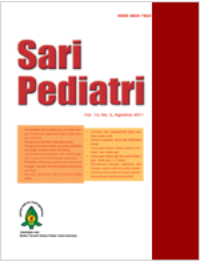Hubungan antara Kortisol Saliva dan Masalah Mental Emosional pada Anak Usia 3–5 Tahun
Sari
Latar belakang. Masalah mental emosional pada anak usia prasekolah harus dideteksi dan diantisipasi sedini mungkin. Masalah mental emosional memengaruhi mekanisme aksis hipotalamus-pituitari-adrenal, menghasilkan produk akhir kortisol.
Tujuan. Menentukan hubungan kadar kortisol saliva dan masalah mental emosional.
Metode. Penelitian potong lintang ini dilakukan pada bulan Desember 2015 - Januari 2016 terhadap 82 anak usia 3–5 tahun yang dititipkan di tempat penitipan anak di Kota Bandung. Orangtua diminta untuk mengisi kuesioner strength and difficulties questionnaire (SDQ) untuk skrining masalah mental emosional subjek. Kortisol saliva subjek penelitian dianalisis menggunakan salivary cortisol kit dari Salimetrics®. Analisis data untuk menentukan hubungan antara kortisol saliva dan masalah mental emosional dilakukan
menggunakan analisis regresi logistik.
Hasil. Terdapat hubungan bermakna antara kadar kortisol saliva dan masalah mental emosional (p=0,027; OR=3,431). Terdapat hubungan bermakna antara kadar kortisol abnormal dengan variabel conduct (p=0,001) dan emosi (p=0,017).
Kesimpulan. Kadar kortisol saliva berhubungan dengan masalah mental emosional pada anak usia 3-5 tahun. Kadar kortisol berhubungan dengan variabel conduct dan emosi.
Kata Kunci
Teks Lengkap:
PDFReferensi
Cooper JL, Masi R, Vick J. Social–emotional development in early childhood: what every policymaker should know. National Center for Children in Poverty. Young Children 2009;August:1-16.
KEMKES RI. Stimulasi, deteksi, dan intervensi dini tumbuh kembang anak. Dalam: RI DK, penyunting. Jakarta: Direktorat Bina Kesehatan Anak; 2006.
National Scientific Council on the Developing Child. Mental health problems in early childhood can impair learning and behavior for life. Harvard University; 2008.
Koppelman J. Children with mental disorders: making sense of their needs and the systems that help them. Washington: National Health Policy Forum; 2004;799:1-24.
Earle J. Emotional and behavioural problems. Dalam: Foyle G, Nathanson V, penyunting. Growing up in the UK: ensuring a healthy future for our children. London: BMA Board of Science; 2013.h.121-48.
Hellhammer DH, Wust S, Kudielka BM. Salivary cortisol as a biomarker in stress research. Psychoneuro endocrinol 2009;34:163-71.
Lupien SJ, McEwen BS, Gunnar MR, Heim C. Effects of stress throughout the lifespan on the brain, behaviour and cognition. Nat Rev 2009;10:434-45.
Cicchetti D, Rogosch FA. The impact of child maltreatment and psychopathology on neuroendocrine functioning. Dev Psychopathol 2001;13:783-804.
Hastings PD, Ruttle PL, Serbin LA, Mills RSL, Stack DM, Scwartzman AE. Adrenocortical responses to strangers in preschoolers: relation with parenting, temprament, and psychopathology. Dev Psychobiol
;53:694-710.
Hatzinger M, Brand S, Perren S, Wyl AV, Stadelmann S, Klitzing KV, dkk. Pre-schoolers suffering from psychiatric disorder show increased cortisol secretion and poor sleep compared to healthy controls. J Psychiatric Res 2012;46:590-9.
World Health Organization. Risk to mental health: an overview of vulnerabilities and risk factors. Geneva: WHO; 2012.
Michaud K, Matheson K, Kelly O, Anisman H. Impact of stressors in a natural context on release of cortisol in healthy adult humans: a meta-analysis. Stress 2008;11:177-97.
Heim C, Ehlert U, Hellhammer DH. The potential role of hypocortisolism in the pathophysiology of stress-related bodily disorders. Psychoneuroendocrinol 2000;25:135.
Gunnar MR, Herrera A, Hostinar CE. Stress and early brain development. Dalam: Tremblay RE, Barr RG, Peters RDeV, Boivin M, penyunting. Encyclopedia on Early Childhood Development [online]. Montreal, Quebec: Centre of Excellence for Early Childhood Development; 2009:1-8 Didapat dari: http://www.child-encyclopedia.com/documents/Gunnar-Herrera-HostinarANGxp.pdf.
Zalewski M, Lengua LJ, Fisher PA, Trancik A, Bush NR, Meltzoff AN. Poverty and single parenting: relations with preschoolers cortisol and effortful control. Inf Child Dev 2012;21:537-54.
Michels N, Sioen I, Huybrechts I, Bammann K, Vanaelst B, Vriendt TD, dkk. Negative life events, emotions and psychological difficulties as determinants of salivary cortisol in Belgian primary school children.
Psychoneuroendocrinol 2012;37:1506-15.
Oosterlaan J, Geurts HM, Knol DL, Sergeant JA. Low basal salivary cortisol is associated with teacherreported symptoms of conduct disorder. Psychiatry Res 2005;134:1-10.
McBurnett K, Lahey BB, Rathouz PJ, Loeber R. Low salivary cortisol and persistent aggression in boys reffered for disruptive behavior. Arch Gen Psychiatry 2000;57:38-43.
Pesonen AK, Kajantie E, Jones A, Pyhälä R, Lahti J, Heinonen K. Symptoms of attention deficit hyperactivity disorder in children are associated with cortisol responses to psychosocial stress but not with daily cortisol levels. J. Psychiatr Res 2011;45:1471-6.
DOI: http://dx.doi.org/10.14238/sp18.1.2016.63-67
Refbacks
- Saat ini tidak ada refbacks.
##submission.copyrightStatement##
##submission.license.cc.by-nc-sa4.footer##
Email: editorial [at] saripediatri.org


Sari Pediatri diterbitkan oleh Badan Penerbit Ikatan Dokter Anak Indonesia
Ciptaan disebarluaskan di bawah Lisensi Creative Commons Atribusi-NonKomersial-BerbagiSerupa 4.0 Internasional.




